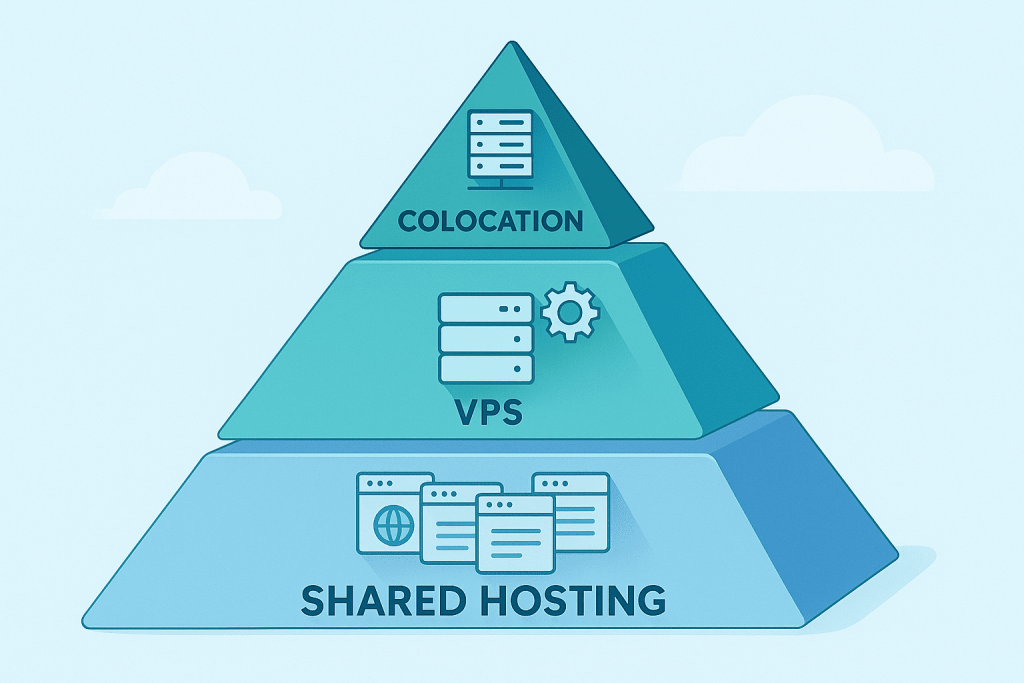
Choosing the right type of website or IT infrastructure hosting directly affects your project’s performance, stability, and security. There are many options on the market, but the three most popular solutions are shared hosting, VPS, and colocation. Each has its own features, advantages, and limitations.
In this article, we will explain how they differ, how to choose the best option for your needs, and what nuances to consider when switching from one solution to another.
Shared Hosting — For a Quick Start
Shared hosting is the simplest and most affordable way to host a website. You get a certain amount of space on a server that is shared with other clients. All technical tasks (software installation, updates, monitoring, security) are handled by the provider.
Ideal for:
- Personal blogs and portfolios.
- Corporate websites with low traffic.
- Landing pages, promo sites, small online stores.
Pros:
- Minimal cost.
- Quick deployment without special knowledge.
- Support from the provider.
Cons:
- Limited resources.
- No full control over the server.
- Possible dependence on the load from other sites on the same server.
Real-life example: you are launching a company’s business card site and want it to work without unnecessary complications — shared hosting will be the best solution.
VPS — For Flexibility and Control
VPS (Virtual Private Server) is a virtual server with dedicated resources and its own OS that you configure for your tasks. It provides a balance between an affordable price and capabilities close to those of a dedicated server.
Ideal for:
- Large catalog online stores.
- SaaS services, CRM systems.
- Websites with 5–10k+ daily visitors.
- Projects that require unique server software configurations.
Pros:
- Full root access and control.
- Guaranteed resources (CPU, RAM, disk space).
- Scalability without moving to new hardware.
Cons:
- Requires administration skills or payment for admin services.
- Higher cost compared to shared hosting.
Real-life example: your online store has grown, integrated with external services, and expanded its product catalog — VPS will allow you to configure the server for these requirements.
Colocation — For Mission-Critical Scale
Colocation is a server placement service in the provider’s data center. You use your own hardware but gain access to professional infrastructure: uninterruptible power supply, climate control, security, and high-speed network channels.
Ideal for:
- Large companies with their own servers.
- Projects with mission-critical data.
- Infrastructure that requires physical control over the equipment.
Pros:
- Full control over the hardware.
- High level of physical and network security.
- Professional operating conditions.
Cons:
- Need to invest in your own hardware.
- Higher cost compared to VPS and hosting.
Real-life example: a financial company required by regulators to store servers on its own hardware chooses colocation.
How to Decide Which to Choose
- Evaluate the budget.
Shared hosting — minimal expenses, VPS — mid-range, colocation — high investment. - Check software requirements.
If you need unique configurations — only VPS or colocation. - Consider the expected load.
The more traffic and the more complex the system, the higher the service level required. - Assess team expertise.
Without admin skills, it’s better to start with hosting; choose VPS or colocation with tech support.
When to Upgrade
- Hosting → VPS: the site slows down, software limitations appear, a separate database or complex scripts are needed.
- VPS → Colocation: the project has grown to a level where buying your own server for scaling and security is more profitable.
Mini Migration Guide
- Create a full backup of all data.
- Set up the new server or environment in the data center.
- Check compatibility of PHP versions, databases, SSL certificates.
- Transfer files and databases, test the site.
- Update DNS records.
Conclusion
- For starting out and small websites: shared hosting.
- For growth and customization: VPS.
- For maximum control and stability: colocation.
A well-chosen solution will not only save money but also help you avoid downtime as your project grows.

Leave a Reply